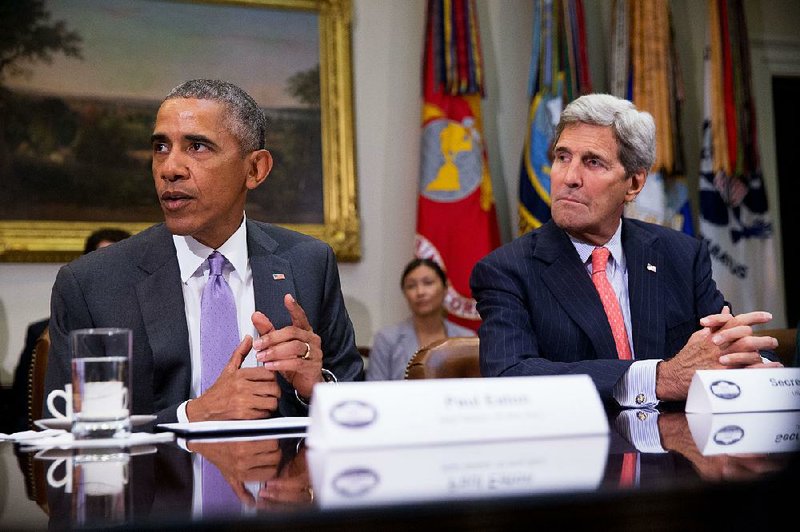WASHINGTON -- Senate Democrats delivered a victory to President Barack Obama on Thursday when they blocked a Republican resolution to reject a six-nation nuclear accord with Iran.
The vote culminated hours of debate on the Senate floor and capped months of discord since the U.S., the United Kingdom, France, Germany, Russia and China announced the agreement with Iran in July.
A procedural vote of 58-42 fell two votes short of the number needed to break a Democratic filibuster, with senators voting largely along party lines. Sens. John Boozman and Tom Cotton of Arkansas, both Republicans, voted for the motion.
Although House Republicans continued to pursue eleventh-hour strategies to derail the international accord, and Senate Republicans promised a revote, Thursday's outcome all but guaranteed that the disapproval legislation would not reach Obama's desk.
Beginning next week, Obama will be free to start scaling back U.S. sanctions to implement the agreement. The accord aims to constrain Iran's nuclear ambitions in exchange for hundreds of billions of dollars in relief from international sanctions.
"This vote is a victory for diplomacy, for American national security and for the safety and security of the world," the president said in a statement. "Going forward, we will turn to the critical work of implementing and verifying this deal so that Iran cannot pursue a nuclear weapon."
Debate over the accord divided Democrats between their loyalties to the president and their constituents, especially Jewish ones; animated the anti-war movement on the left; and exposed the waning power of the Israeli lobbying force that spent millions to prevent the accord.
"Regardless of how one feels about the agreement," said Sen. Charles Schumer of New York, one of four Democrats to vote against the president, "fair-minded Americans should acknowledge the president's strong achievements in combating and containing Iran."
Acknowledging the tortured decision he and other skeptical Democrats faced, Schumer said, "I also have a great deal of respect for the careful thought and deliberation my colleagues went through," adding, "I recognize for them that this is a vote of conscience just as it is for me."
Frustrated Republicans railed against Democrats for using a procedural vote to block final passage of the disapproval resolution, and issued grim warnings about a deal they contend could serve only to enrich Iran and leave it closer to building a bomb when constraints begin to ease in 10 or 15 years. They promised that Thursday's vote would not be the Senate's last word, and moments after it was over Senate Majority Leader Mitch McConnell set the stage for another vote next week.
"No amount of saying this issue is over makes it over," McConnell declared, adding that if a Republican wins the White House next year, "I say to Iranian observers of the debate, [the deal] will be looked on anew."
But Democrats led by Minority Leader Harry Reid of Nevada promised that any further votes would have the same outcome "and are just simply a waste of time."
"People around the world should know today's outcome was clear, decisive and final," Reid said.
HOUSE MEASURES
In the House, Republicans had not given up on blocking the deal against all odds. After backtracking on plans to vote on the disapproval resolution when it began to look short of support in the Senate, House Republicans lined up votes on several related measures.
Late Thursday, they agreed on a party-line 245-186 vote to a measure specifying that Obama had not properly submitted all documents related to the accord for Congress' review, and therefore a 60-day review clock had not really started.
That will be followed by votes today on a bill to approve the accord and on a measure that would prevent Obama from lifting congressionally mandated sanctions on Iran.
"This debate is far from over, and frankly, it's just beginning," said House Speaker John Boehner, R-Ohio. "This is a bad deal with decades-long consequences for the security of the American people and our allies. And we'll use every tool at our disposal to stop, slow, and delay this agreement."
Underscoring the fierce politics, the National Republican Senatorial Committee sent out news releases within moments of the Senate vote criticizing Democratic senators for their votes.
Some House Republicans have begun suggesting a lawsuit to stop the accord. Boehner called that "an option that is very possible."
Yet the House Republican maneuvers seemed to have little chance of bearing results, and White House officials branded them the "Tortilla Coast Gambit," a reference to a Capitol Hill restaurant where lawmakers from the tea party movement often plan their moves. Even before the Senate voted, White House press secretary Josh Earnest was boasting of the administration's success.
"Look, if we were sitting here just a month ago, back in mid-August, talking about how things would be resolved in Congress ... and I told you that neither house of Congress would pass a resolution of disapproval for this agreement, you'd be shocked," Earnest said. "That's an indication of the kind of progress that we've made."
Information for this article was contributed by Jennifer Steinhauer of The New York Times and by Erica Werner, Deb Riechmann, Darlene Superville, Nancy Benac, Alan Fram and Mary Clare Jalonick of The Associated Press.
A Section on 09/11/2015
